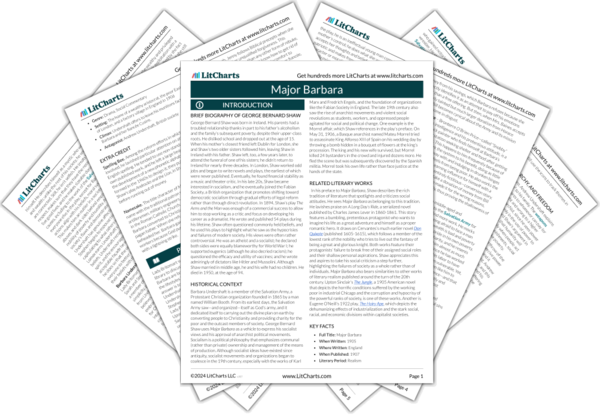In the preface to Major Barbara, George Bernard Shaw offers a bold interpretation of Christianity and what he perceives as the failures of modern society when he declares that the essential core of Christianity is radical forgiveness. He uses the play to present this idea in action and works out its political implications in the preface. Barbara and her fellow Salvationists offer no-strings-attached forgiveness, taking the central idea of Christianity—that Jesus Christ’s death redeemed every human sin—literally. In contrast, however, while Barbara’s society preaches this gospel, few people live out its implications. Thus, Lady Britomart refuses to forgive Andrew Undershaft for his participation in the weapons trade or any of his other deviances from her standard sense of morality. Like most of society, she feels that only a fitting punishment (like being estranged from his family) can teach him or any other sinner to behave.
In contrast, Salvationists Barbara, Jenny Hill, Mog Habbijam, and Todger Fairmile emulate Christ’s example by offering forgiveness free of any hint of punishment or payment. They refuse to return Bill Walker’s blows with blows of their own or take his money as a fine, instead praying for his soul even when he expresses no remorse. It’s this radical approach that allows Barbara to claim that there are neither good men nor scoundrels, just an undifferentiated mass of humanity, each member of which relies on the goodness and mercy of God. Thus, Barbara more readily forgives her father than her mother does, because she understands that his judgement belongs to God, not her. And this, the play suggests, is not only the best way to practice Christianity, but the only way that humanity has hope of transcending its social failures.
Punishment and Forgiveness ThemeTracker

Punishment and Forgiveness Quotes in Major Barbara
You will never get a high morality from people who conceive of their misdeeds as revocable and pardonable, or in a society where absolution an expiation are officially provided for us all. […] Thus Bill Walker, in my play, having assaulted the Salvation Lass, presently finds himself overwhelmed with an intolerable conviction of sin [… But the Salvation Army] will not punish him: it will not take his money. It will not tolerate a redeemed ruffian: it leaves him no means of salvation except ceasing to be a ruffian [… Barbara] refuses to prosecute a drunken ruffian; she converses on equal terms with a blackguard to whom no lady should be seen speaking in the public street: in short, she imitates Christ. Bill’s conscience reacts to this […] He is placed in a position of unbearable moral inferiority, and strives by every means in his power to escape from it.
In proof I might point to the sensational object lesson provided by our commercial millionaires today. They begin as brigands: merciless, unscrupulous, dealing out ruin and death and slavery to their competitors and employees […] Captain Kidd would have marooned a modern Trust magnate for conduct unworthy of a gentleman of fortune. The law every day seizes on unsuccessful scoundrels of this type and punishes them with a cruelty worse than their own […]
But the successful scoundrel is dealt with very differently, and very Christianly. He is not only forgiven: he is idolized, respected, made much of, all but worshipped. Society returns him good for evil in the most extravagant overmeasure. And with what result? He begins […] to live up to the treatment he receives. He preaches sermons; he writes books of the most edifying advice to young men […] he endows educational institutions; he supports charities […]
BARBARA. Weve just had a splendid experience meeting at the other gate in Cripp’s lane. Ive hardly ever seen them so much moved as they were by your confession, Mr Price.
PRICE. I could almost be glad of my past wickedness if I could believe that it would elp to keep hathers stright.
BARBARA. So it will, Snobby. How much, Jenny?
JENNY. Four and tenpence, Major.
BARBARA. Oh Snobby, if you had given your poor mother just one more kick, we should have got the whole five shillings!
[…]
UNDERSHAFT. Shall I contribute the odd twopence, Barbara? The millionaire’s mite, eh? (He takes a couple of pennies from his pocket).
BARBARA. How did you make that twopence?
UNDERSHAFT. As usual. By selling cannons, torpedoes, submarines, and my new patent Grand Duke hand grenade.
BARBARA. Put it back in your pocket. You cant buy your Salvation here for twopence: you must work it out.
BILL. Aw downt want to be forvive by you, or be ennybody. Wot Aw did Aw’ll py for. Aw trawd to gat me aown jawr browk to settisfaw you—
JENNY (distressed). Oh no—
BILL (impatiently). Tell y’Aw did: cawnt you listen to wots bein taold you? All Aw got be it was being mide a sawt of in the pablic street for me pines. Well, if Aw cawnt settisfaw you one wy. Aw ken anather. Listen eah! Aw ed two quid sived agen the frost; an Awve a pahnd of it left. […] Eahs the manney. Tike it; and lets ev no more o your forgivin an pryin and your Mijor jawrin me. Let wot Aw dan be dan an pide for; and let there be an end of it.
JENNY. Oh, I couldnt take it, Mr Walker.











